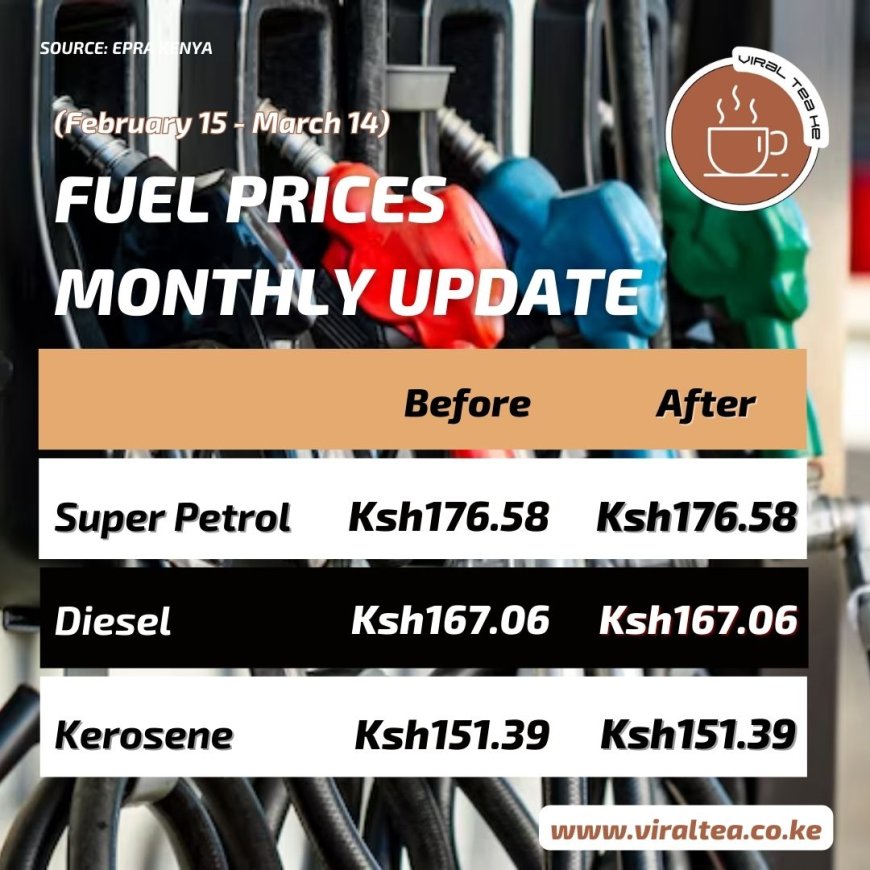In accordance with Section 101(y) of the Petroleum Act 2019 and Legal Notice No.192 of 2022, we have calculated the maximum retail prices of petroleum products, which will be in force from 15th February 2025 to 14th March 2025
The Energy and Petroleum Regulatory Authority (EPRA) has given an update on the prices of Super Petrol, Diesel, and Kerosene fuel products, set to take effect at midnight tonight.
The fuel regulator announced on Friday, February 14 that the prices of the three fuel products will remain unchanged from the previous monthly review.
“In accordance with Section 101(y) of the Petroleum Act 2019 and Legal Notice No.192 of 2022, we have calculated the maximum retail prices of petroleum products, which will be in force from 15th February 2025 to 14th March 2025,” announced EPRA.
“In the period under review, the maximum allowed petroleum pump prices for Super Petrol, Diesel and Kerosene remain unchanged.”

Fuel watch: New fuel prices as announced by EPRA on February 14, 2025
This means that in Nairobi, Super Petrol, Diesel and Kerosene will continue to retail at Ksh176.58, Ksh167.068 and Ksh151.39 effective midnight for the next 30 days, beginning Saturday, February 15 to Friday, March 14.
The prices are inclusive of the 16% Value Added Tax (VAT) in line with the provisions of the Finance Act 2023, the Tax Laws (Amendment) Act 2024 and the revised rates for excise duty adjusted for inflation as per Legal Notice No. 194 of 2020.
Despite the fuel prices remaining unchanged for the next month, the regulatory body informed that the average landing cost of imported Super Petrol, Diesel and Kerosene all increased.
“The average landed cost of imported Super Petrol increased by 2.80% from $611.69 per cubic metre in December 2024 to $628.80 per cubic metre in January 2025; Diesel increased by 4.20% from $644.10 per cubic metre to $671.14 per cubic metre while Kerosene increased by 4.89% from $649.64 per cubic metre to $681.44 per cubic metre over the same period,” EPRA noted.
Currently, Kenya imports all its petroleum product requirements in refined form and the products are traded in international markets based on a pricing benchmark.
Further, the trade of petroleum products in the international markets is denominated in United States Dollars (USD), and an exchange rate is applied to convert the USD to KShs during the computation of local pump prices.
Nonetheless, EPRA explained that the purpose of the Petroleum Pricing Regulations is to cap the retail prices of petroleum products which are already in the country so that importation and other prudently incurred costs are recovered while ensuring reasonable prices to consumers.
“EPRA wishes to assure the public of its continued commitment to the observance of fair competition and protection of the interests of both consumers and investors in the energy and petroleum sectors,” the regulator added.
More to follow…
